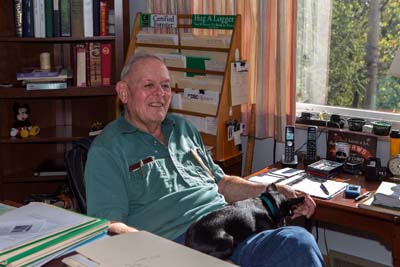Bill Gillespie: Forester, Naturalist, Fossil Expert
By Sheila McEntee

Bill Gillespie. Photo by Al Peery.
In a spacious office in his Charleston home, Bill Gillespie lowers his imposing frame into the swivel chair behind his desk. Then, with a bemused smile, he looks down at the floor and pats his lap, inviting Wilbur, his black Chihuahua, to join him.
Thus settled in, he leans back and surveys certificate-covered walls that proclaim him, among other distinctions, a certified forester and a member of the West Virginia Lumberjack Hall of Fame. Finally, he points toward a large color portrait of West Virginia University’s Woodburn Hall. “If not for this one,” he says, “I’d be in that one.” His index finger travels to a large photo of coal miners exiting a mine. Beneath the photo, there’s a typewritten note: “Life undoubtedly would not have been as rosy.” Below the note are two more pencil-scrawled words: “Thanks, Mom.”
Indeed, as a boy growing up in the shadow of the Number 4 Mine at Byers in Webster County, Bill Gillespie thought he’d one day become a miner like other local boys. Instead, his love of nature—and more than a small bit of prodding from his mother—would eventually make him one of our state’s top authorities on trees and an internationally acclaimed expert on geology and fossil plants.
William Harry Gillespie was born in Webster Springs to William Marston “Mart” Gillespie and Rosalie Geneva Frazee Gillespie. Mart was born in Webster County and Rosalie in Pocahontas County; both were graduates of Webster County High School and the first ones in their families to attend high school. Mart and Rosalie appreciated the value of a good education and instilled in their three children the importance of school. Bill still has his parents’ high school diplomas. “They were real proud of them,” he says.
Yet, Bill’s family education ethic reaches back even further. His grandfather, Elijah H. Gillespie, taught school at Gillespie in Braxton County. In those days, teachers had to sign yearly contracts. One year, Elk River was so high the agent for the school system couldn’t get Elijah’s contract to him. So, he bundled it up and threw it across the river. Elijah caught it, signed it, and threw it back.
Sometime after that, Elijah became a teacher in Bergoo and then opened a store in Webster Springs. His business prospered, and by 1912, he’d opened a new, larger store in what became known as the “Gillespie Building.” Elijah’s business thrived until the 1920s, when the local economy began to weaken.
Unfortunately, “the Depression of ’29 wiped him out,” Bill says. “He was a disillusioned man after that.”
In 1937, when Bill was six, the family moved six miles up Elk River to Number 4 Mine, where Mart became the company bookkeeper. In those first days, there was only the coal tipple, an office, and a store. The company built the Gillespies a six-room house on “Bosses Row,” literally a stone’s throw from the tipple. (Homes for the miners were built in nearby river bottoms.) A year later, a school opened, and Bill, having attended first grade in Webster Springs, began second grade at Byers.
“When I went into second grade, I was the only boy who could fit in a standard-size desk,” Bill recalls. “Everyone else was much bigger. There had never been a school there, and the children were 15 and 16 years old, going to first and second grade. People don’t realize that that was the way it was in those days.”
The school had two rooms, one for the first through fourth grades and one for fifth through eighth. There were two teachers, who traveled long distances by car and log train every day. The children traveled a shorter route and were expected to be independent from a young age.
“We walked under the tipple, along the railroad tracks, and down over the hill to the school,” Bill explains. “You wouldn’t allow six and seven year olds to do that today for anything. But we never thought a thing of it.”
Bill attended school at Byers until eighth grade. From age 10 on, he worked during the summer. “People laugh, and they don’t believe me, but my mother was very firm in her ways, and she had ideas about what I should and shouldn’t do,” he says. “She was always on hand to see that I had a summer job.”
As a boy, Bill largely did household chores for people, like carrying water from the well (for a nickel a tub) and splitting firewood. He was allowed to keep the money he earned but not to spend it.
You can read the rest of this article in this issue of Goldenseal, available in bookstores, libraries or direct from Goldenseal.